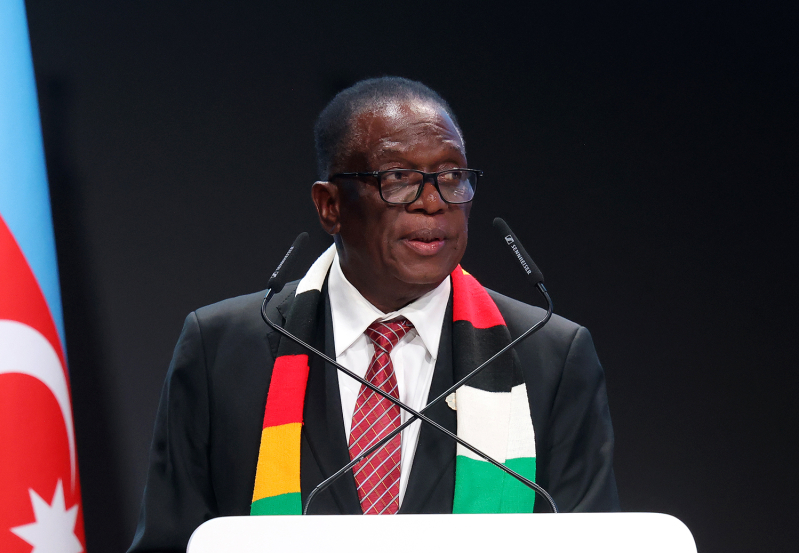
The President of Zimbabwe, Emmerson Mnangagwa, signed into law the Death Penalty Abolition Act (2024) effectively removing the death penalty sentence in the penal code. Although the Southern Africa country has not carried out death sentences for nearly two decades, 62 people who had been sentenced to death will be resentenced or have their death sentences commuted.
Zimbabwe’s cabinet approved the Death Penalty Abolition bill in February 2024 following the approval of the bill by the National Assembly and the Senate. The private member’s bill had been introduced by opposition member of parliament, Edwin Mushoriwa, in 2023. It received backing from both sides of the political divide and was also a result of a “sustained collaboration between government and civil society for almost a decade,” noted The Death Penalty Project, a legal-action charitable trust.
“I am delighted that the Death Penalty Abolition Act has become law. Removing the death penalty sends a message to all that our nation should respect and uphold the value of human dignity. This achievement is a move in the right direction,” said Hon. Mushoriwa.
The Executive Director of Amnesty International Zimbabwe chapter, Lucia Masuka, applauded the country’s decision to abolish the death penalty for all crimes, but regretted the possibility of its reinstatement during a state of emergency under the Defence Act.
“This is not just great progress for Zimbabwe, it is also a beacon of hope for the abolitionist movement in the region, and a major milestone in the global collective pursuit for an end to this ultimate cruel, inhuman and degrading punishment,” said Masuka.
Zimbabwe has become the 27th country in Africa to scrap the death penalty for all crimes. Other countries that fully abolished the death penalty include the Central African Republic, Chad, Zambia, Sierra Leone, Rwanda, South Africa and Ivory Coast. 18 African countries such as Malawi, Kenya, Uganda and Tanzania still retain the death penalty in their penal code but have not executed people in over two decades
The European Union, while applauding the abolition of the death penalty, also urged Zimbabwe to remove the provision for the temporary reintroduction of the death penalty during a state of public emergency.
More than 100 prisoners executed in the Democratic Republic of Congo
Barely a week after Zimbabwe enacted the Death Abolition Act, the Democratic Republic of Congo announced that it had executed 102 inmates in December 2024 with another 70 more set to be executed later. Some of the death row inmates, aged between 18 and 35 years, had been convicted for being part of the “urban bandits” locally known as Kulunas that the government had said were terrorizing residents.
It is suspected that about 40 of the executed prisoners had been arrested and sentenced for organizing and participating in a failed coup in DRC in May 2024 while another 13 Congolese soldiers had been found guilty of desertion.
Congo had abolished the death sentence in 1981, but it reinstated it in 2006 under the Military Penal Code. Most of the executed prisoners were tried in military court. Congo has been under pressure to act against urban crime but human rights defenders, including Amnesty International Deputy Regional Director for East and Southern Africa, Sarah Jackson, have questioned the imminent mass executions “amid a lack of reliable information about the status of people sentenced to death.”
“President Felix Tshidekedi must immediately, publicly and unambiguously halt any plans to execute people in Angenga prison or elsewhere. Parliament should adopt a moratorium on executions, pending full abolition of the death penalty,” added Jackson.
Similarly, Action by Christians for the Abolition of Torture in DRC (ACAT-DRC) has been lobbying and pushing back against what they describe as a cruel, inhuman and degrading sentence. The association has also been fighting against abusive pre-trial detention by distributing food and medicine to prisoners who are held in overcrowded and unhygienic facilities.
In an interview with Prison Insider, ACAT-DRC’s Michel Kalemba said incarceration often leads to abandonment by families. “Prisoners sentenced to death, even more so than other prisoners, are often incarcerated in isolated prisons because those are the ones with advanced security systems,” said Kalemba.
Advocates of the abolition of the death penalty have argued that execution is an extreme punishment especially in Africa where convicts are kept in dehumanising conditions while waiting to be executed which is a “type of torture.”
Kalemba said that a number of senior government officers in the current DRC regime were once convicted by the Kinshasa military court for participating in the insurrectionary movement. They were saved by a moratorium that had set aside the death penalty but have now lifted the moratorium.
“If they do not take advantage of being in power to abolish the death penalty, the day may come when - as it did in 2003 - the moratorium is lifted and people will be executed. As direct abolition seems unlikely at this time, an interim solution would be to establish a de jure moratorium, which would be more secure. This would save people from getting up every morning and thinking, 'The executions will start up again today',” said Kalemba.





